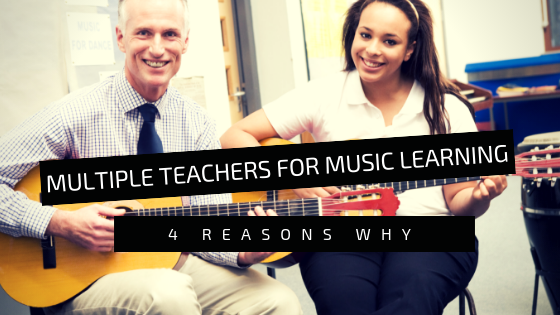There has always been an open debate about whether
there is some real benefit from the different ideas brought in by multiple
teachers. We have found that having multiple teachers assigned to one
instrument has multiple benefits. And learning from more than one teacher pushes
you to get the best out of your instrument. Let us understand how you can
benefit from the teachings of more than one teacher.
1.
Different Musical Influences
One of the biggest challenges learning from multiple teachers are
the different influences they are exposed to. Suppose one teacher maybe more
into Rock & Roll music whereas the other teacher maybe into jazz or blues
and so on. But, then again you should be exposed to all the different styles of
music when you are learning so that you can discover variety in music and then
have numerous options to decide which one you love the best or if you want to
experiment some fusion between those two styles in your later stage of playing
your instrument. The best part of learning music is that there are variety of
styles and genres, and without trying out a few different flavors, you won’t
know which you love the best.
2.
Perspective, Approach & Ideas
Different teachers will
have different approach to the lessons and varying perspective, however the
goal of the lesson remains the same, that the student understands how to apply
the lesson in his/her playing. These helps the student to approach their
playing in variety of manners, and they follow what helps them the best in
making progress. While, they may understand one topic better from the explanation
of a concept from one teacher, they can re-apply that knowledge with the
concept from another teacher and understand the actual use of that topic with
regard to their instrument.
3.
Better Retention of
Information
In learning an
instrument from multiple teachers , there are lot of common topics that one
will come across, even in different instruments. The repetition of the common
information, be it in a different approach helps retaining that lesson in
student’s learning. Lessons are usually taught and then never pondered upon for
a long time after that lesson has served its purpose, and although students are
familiar with the topic, they never get a clear grasp of the information
taught. Coming from different teachers at different times will help the
students revise and retain the important information of the lesson and guide
them to a better progress.
4.
No Disruption of Class
Students will rarely face Class cancellation or disruption when one of
their teachers are on leave as another qualified teacher will be available to
take their class. Teachers share reports about students after every session and
therefore students are well attended to, classes pick up right where they left
off.
More information can
never hurt your learning as long as the egos of teachers and favoritism of the
student doesn’t exist. Everyone starts learning from someone, so why not
learning from different individuals who bring different characteristics to
their approach which will give you the platform to see Music in all the
different perspective and lets you take the best of all worlds.
At BlueTimbre we have
found this method to not only work but work well! Students are often excited
and look forward to which teacher may be coming into class that day. While our
class structure, techniques, methodology remains the same across all subjects, a
different teacher’s personality or new perspective on the same topic inspires
students. We would go as far as to say that you must have multiple teachers for
a subject so that you get the complete experience. Multiple teachers give you
multiple experience, insight and more!
BlueTimbre is a Music Company with Music Education spaces, Jam Room and Recording studio located in Whitefield, Bangalore, India. BlueTimbre provides complete end-to-end Music Education solutions for schools. The BlueTimbre team comes with decades of cumulative experience in running structured businesses, music curriculum development, music education and performance.












